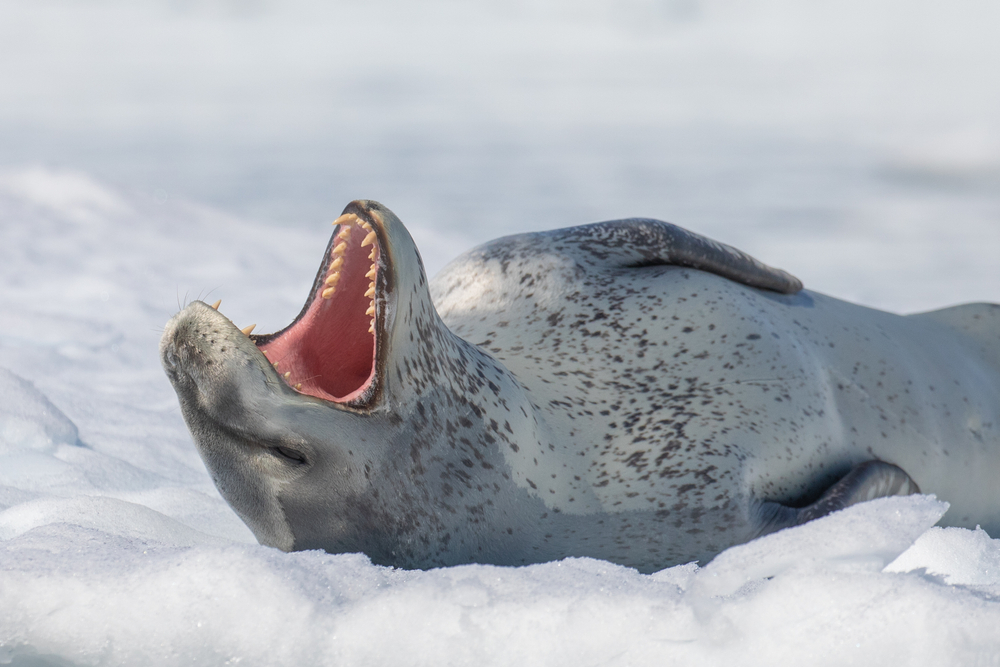Kirsty Brown, 28, was a skilled diver and dedicated marine biologist.
But in 2003, her passion for the ocean turned into a nightmare when she was suddenly attacked by a massive leopard seal.
The incident ended in a devastating tragedy that left her loved ones, friends, and colleagues in shock.
For 28-year-old Kirsty Brown, traveling to Antarctica was more than just a career move — it was the fulfillment of a lifelong dream. Described as driven, bubbly, and talented, she joined the British Antarctic Survey (BAS) in 2002 with plans to spend 30 months working on the remote continent.
But she never made it through her full assignment.
In July 2003, tragedy struck when Kirsty was fatally attacked by what newspapers at the time described as a ”giant” leopard seal, one of Antarctica’s most powerful predators.

The horrific incident unfolded while Kirsty was snorkeling to examine an iceberg. Shocked colleagues on shore could only watch helplessly as the massive animal dragged her beneath the icy water.
Her team quickly launched a rescue boat and managed to pull her from the sea, but it was too late. Even after reaching the medical facilities at the research center, attempts to revive Kirsty failed.
At the time of Kirsty’s death, BAS released a statement saying, “Despite carrying out cardio-pulmonary resuscitation for one hour, the station doctor and [her] colleagues were unable to revive her.”
Virtually unheard of
Officials later described the attack as a freak accident. According to The Evening Standard, her death was the first known fatal seal attack on a human since the Scott Expedition in 1912, also in Antarctica.
Leopard seals, which can grow up to 11 feet long and weigh as much as 1,100 pounds, are usually solitary hunters that prey on penguins.
Like other top predators such as tigers and polar bears, leopard seals are fascinating and charismatic animals. They exist in relatively small numbers, making them difficult to find.
But attacks on humans are virtually unheard of unless the animals feel provoked.
“In 30 years we have never experienced anything likes this,” a BAS spokesman said at the time.
“Leopard seals are incredibly inquisitive, but are not normally aggressive. If a diver can see a leopard seal, then they will not go in the water because there is a small risk. But to our knowledge, this has never happened before.”

Kirsty was no amateur — she was an experienced diver and had a “dive buddy” with her during the mission. But even that wasn’t enough to save her.
According to BAS, both were in wetsuits and attached to safety ropes when the seal struck without warning.
One theory later suggested the seal may have mistaken Kirsty for a penguin. After dragging her underwater, the predator might have realized its error and let go, but by then, the damage was done.
At the time, Lloyd Peck, a BAS ecophysiologist and Head of the Life at the Edge: Stresses and Thresholds (LATEST) Research Program, explained that diving during the winter months was a routine part of research and not generally viewed as especially dangerous.
How her memory lives on
He remembered Kirsty as “full of energy and enthusiasm … a good scientist who worked very hard and could do boring mundane aspects of work with a smile on her face.” Peck added that he “wished all scientists were like Kirsty” and emphasized that the team was committed to continuing her project.
The shocking death sent ripples through the scientific community. Chris Rapley, director of the British Antarctic Survey, remembered her fondly:
“Kirsty was one of those young people who delight in the outdoors, especially when work can be combined with some element of adventure. We called her Bang because she was the noisiest girl in the group.”
Kirsty’s memory is sure to live on for a long time, not just through the work she inspired, but also through the small island in Ryder Bay that now bears her name.
Kirsty Island, a small spot between Lagoon and Léonie Islands, stands out with its reddish rock formations and is a popular site for both research and recreation for scientists based at Rothera Station.
The thought of being dragged into the freezing depths by such a massive creature is truly terrifying. Kristy’s final moments must have been filled with unimaginable fear. May she rest in peace.
